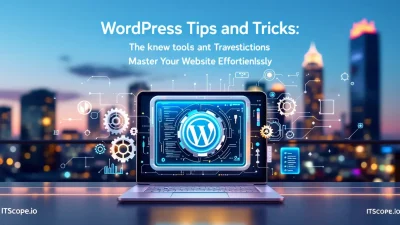Welcome to the all-encompassing journey of WordPress site management! Imagine steering a ship across the vast digital ocean without a map. Scary, right? Managing a WordPress site without a solid plan feels just the same. With millions navigating the WordPress waters, mastering its maintenance can set you apart. Whether you’re an IT professional or a digital marketer, understanding how to maintain your site efficiently is the key to keeping it running smoothly and securely.
In this guide, you’ll uncover the secrets to seamless WordPress management, from essential updates to advanced optimization strategies. Let’s dive in and transform your site management skills. Here’s what we’ll cover today:
Table of Contents
- The Importance of Regular Updates
- Backup Strategies for WordPress
- Ensuring Site Security: Best Practices
- Optimizing Site Performance
- Essential Plugins for Site Management
- Common Maintenance Mistakes to Avoid
- FAQs
The Importance of Regular Updates
Ensuring regular updates for your WordPress site management is vital for maintaining a secure and optimally functioning website. Failing to update can leave your site vulnerable to cyber threats and performance issues. But why exactly are updates so crucial?
- Security Enhancements: Regularly updating your WordPress site helps patch security vulnerabilities that might otherwise be exploited by hackers. Think of each update as sealing a window to prevent unwanted intruders.
- Bug Fixes: Software glitches are inevitable. Updates often address these bugs, ensuring your site runs smoothly without unexpected hitches.
- New Features: Each update can bring exciting new functionalities that enhance user experience, keeping your site competitive and engaging. Staying up-to-date means you’re offering visitors the latest in WordPress technology.
- Improved Performance: Updates can significantly boost site speed and reliability, reducing downtime and ensuring a seamless visitor experience.
External tools like ManageWP can simplify the update process, especially if you’re managing multiple sites. For step-by-step guidance, consider checking out this detailed guide on WordPress sites.
Regular updates in WordPress management ensure robust security and flawless functionality.
How to Implement Updates Effectively
Implementing updates efficiently is just as important as the updates themselves. Make sure to backup your entire site before starting any updates. Use reliable management tools to automate the update process and minimize errors. For further insights, visit resources such as WP Beginner for comprehensive tips on handling WordPress website management. By keeping your WordPress management up-to-date, you safeguard not only the site but also its success.
Backup Strategies for WordPress
Ensuring your WordPress site is safely backed up is crucial for WordPress site management. Let’s walk through effective strategies to safeguard your data.
- Identify What Needs Backup: Decide if you’re backing up the entire site or just crucial components. Generally, focus on themes, plugins, media files, and the database — your site’s backbone.
- Select a Reliable Backup Plugin: Use plugins like UpdraftPlus or BackWPup, known for their simplicity and effectiveness. These plugins allow you to automate your backup schedules, ensuring no data is lost without effort.
- Automate Your Backups: Schedule regular backups using your plugin settings. Set them to run during off-peak hours to minimize impact on your site’s performance.
- Test Your Backups: Regularly test your backup files to ensure they are complete and functional. This practice avoids unpleasant surprises during a crisis.
- Store Backups Securely: Use cloud storage solutions such as Google Drive or Dropbox to keep your files safe from physical or digital mishaps.
Consistently implementing these steps will ensure robust WordPress management and peace of mind. Effective WordPress website management requires vigilance.
Backup Tools Comparison
| Plugin | Features |
|---|---|
| UpdraftPlus | Scheduling, Cloud Integration, Easy Restore |
| BackWPup | Comprehensive Backups, Database Checks, Storage Options |
Regular backups are not just preventive maintenance but a key element of a strong WordPress management strategy. Every site manager should embrace these practices to mitigate risks and enhance site resilience.
Learn more about managing WordPress sites effectively.
Ensuring Site Security: Best Practices
Site security is paramount for effective WordPress site management. Keeping your website safe from threats protects not only your data but also your brand’s reputation. Here are some essential security practices for mastering WordPress management.
- Regular Updates: Always keep WordPress core, themes, and plugins up to date. Each update typically patches known vulnerabilities, making your site more secure. Tools like ManageWP can help automate updates across multiple sites.
- Use Strong Passwords: Employ strong, unique passwords for all user accounts. Encourage users to change their passwords regularly and consider using a password manager for added security.
- Install Security Plugins: Leverage security plugins like Wordfence or Sucuri to add extra layers of protection. These plugins provide features like firewalls, malware scanning, and login protection.
- Regular Backups: Set up regular backups to prepare for potential data loss. Services like BlogVault and UpdraftPlus help automate this process, allowing you to restore your site quickly if needed.
- Monitor User Activity: Track activity logs to spot unusual behavior. Limited user permissions reduce the risk of unauthorized activity.
Effective wordpress website management requires diligent security measures.
Consider engaging with expert communities for additional insights into secure WordPress management. Raising awareness and consistently applying these practices significantly enhance the security of your WordPress site.
Additional Resources
For more security tips and to learn how to manage multiple WordPress sites efficiently, check out WPBeginner’s guide.
Optimizing Site Performance
The performance of your website is critical for maintaining a dynamic and engaging user experience. Let’s dive into how you can enhance your WordPress site management with some effective strategies.
- Leverage Caching Plugins: Installing caching plugins can significantly speed up your site by storing static versions of your pages. This reduces load time and server requests, boosting performance. Tools like ManageWP provide mechanisms to automate this process.
- Optimize Images: Large images can slow down your site. Use image compressors or plugins like Smush to reduce file sizes without losing quality, enhancing overall WordPress website management.
- Minimize HTTP Requests: Combine files where possible, like CSS and JS, to reduce the number of HTTP requests. This simplifies your resources and enhances loading times.
- Choose a Reliable Hosting Provider: Adequate hosting ensures server reliability, impacting your site’s uptime and speed. Explore providers under the guidance of solid WordPress management practices.
- Regularly Update Your Website: Keeping WordPress, themes, and plugins up-to-date is essential for security and performance. Automated solutions like those suggested by WPBeginner can help streamline these updates.
Measure Performance
To keep an eye on your website’s efficiency, tools like Google PageSpeed Insights and GTmetrix offer insights into performance bottlenecks. Regularly checking your site’s speed and user experience metrics ensures ongoing optimization.
Regular site performance checks and optimizations can dramatically improve user retention and satisfaction, a key benefit of effective WordPress site management.
| Optimization Technique | Benefits |
|---|---|
| Caching Plugins | Faster load times and reduced server load |
| Image Optimization | Quicker page rendering and lower bandwidth usage |
| HTTP Minimization | Improved resource loading efficiency |
Essential Plugins for Site Management
Managing a WordPress site effectively requires the right tools. Essential plugins can transform your WordPress management efforts, making tasks like updates, backups, and security much more manageable. Here’s how you can optimize your site management using plugins.
Plugin Management Made Easy
- BackupBuddy: This plugin ensures your site data is safe by creating regular backups. It’s crucial whether you run a small blog or a large e-commerce setup. Backups can be restored with just a click, which saves a lot of headaches down the road.
- Wordfence Security: With Wordfence, you enhance your site security. It scans for malware, alerts on security breaches, and blocks malicious traffic.
- WP Rocket: To boost your site’s performance, WP Rocket comes in handy. It optimizes caching, reducing page load times significantly.
Integrate with WordPress Management Platforms
Consider using platforms like WPBeginner and ManageWP for overseeing multiple sites effortlessly. These platforms let you update plugins and themes from one dashboard, enhancing efficiency.
For more tips on WordPress management, check our ultimate guide for IT professionals.
Utilizing the right plugins can streamline your WordPress website management and improve site performance.
Common Maintenance Mistakes to Avoid
Proper wordpress site management can elevate your digital presence, but missteps along the way can lead to headaches and lost time. Let’s pinpoint the usual pitfalls in wordpress management and keep your site running smoothly.
- Neglecting Updates: Ensure all plugins, themes, and core WordPress files are updated regularly. Failing to do so can compromise your site’s security and performance. This comprehensive guide offers helpful tips.
- Ignoring Backups: Not backing up regularly can lead to data loss. Use reliable backup solutions like ManageWP to ensure you never lose essential data. Learn more here.
- Overlooking Security Measures: Protect your site with essentials like SSL certificates and security plugins. Read more about effective WordPress security tips.
Avoiding these mistakes is integral to efficient wordpress website management. If you’re new to WordPress, catch up on What is a WordPress Site: The Ultimate Guide for IT Professionals.
Preventing common errors is key to mastering wordpress site management.
FAQs
What is the best plugin for WordPress site management?
Choosing the best plugin for WordPress site management depends on your specific needs. Many professionals recommend the SolidWP plugin for its robust features and ease of use.
How do I manage multiple WordPress sites effectively?
Managing multiple WordPress sites can be streamlined using solutions like ManageWP, which allows you to oversee all your sites from a single dashboard.
What are essential tasks in WordPress website management?
Essential tasks include regular backups, updates, security checks, and performance monitoring. For a comprehensive overview, explore our WordPress Site Guide.
Is it necessary to back up a WordPress site?
Yes, regular backups are crucial for safeguarding your data against loss or damage. It’s advisable to use automated backup solutions as part of your WordPress site management strategy.
How can I improve WordPress site security?
Improving WordPress site security involves using strong passwords, regular updates, and employing security plugins such as Wordfence. Always monitor login attempts and protect sensitive information.



